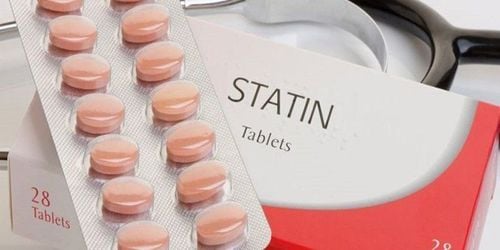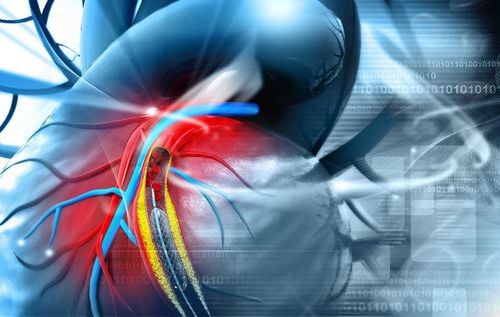This is an automatically translated article.
The article was consulted with Dr. Nguyen Van Duong - Interventional Cardiologist - Cardiovascular Center - Vinmec Central Park International General Hospital.Infective endocarditis is an infection of the endocardium, which is the inner lining of the heart's chambers and valves. If not treated quickly, endocarditis can damage or destroy heart valves and lead to life-threatening complications.
1. What is infective endocarditis of the heart valves?
Infective endocarditis is a bacterial or fungal infection of the endocardium of the heart, and, rarely, Rickettsia and Chlamydia.In which, the nature of the disease is the formation of warts in the endocardium, often occurring in the heart valves, can be present in the defect due to ventricular septal defect or endocardial heart at any position. The disease can also be in the endothelium of the arterial or venous catheter, so it is also called arteritis.
The disease is often severe, causing death from acute heart failure if left untreated. Even with correct and early treatment, mortality is still very high, depending on the cause of the disease and the patient's location.
2. How to treat infective endocarditis of the heart valves?
Treatment of valvular infectious endocarditis is primarily the use of antibiotics in combination with conventional cardiovascular support agents, as is the case with cardiac lesions that are not due to infective endocarditis.In which, the initiation of antibiotic therapy should adhere to the following treatment principles:
Isolate bacteria before taking drugs to find the causative agent, make an antibiotic map. The minimum inhibitory concentration should be determined, the minimum bactericidal concentration if possible. Severe patients with acute progression should immediately culture 3 blood samples at 1-2 hour intervals and then start empiric antibiotic therapy immediately. At this time, the delay in taking the drug is only waiting to take the specimen for blood culture, not wait for the blood culture result. Choose antibiotics with bactericidal effects, not alkaline ones. Use high doses to achieve effective concentrations in warts and continue for at least 4 to 6 weeks to ensure no recurrence. Administer intravenously to achieve high serum concentrations. The interval between injections depends on the half-life of the drug.

3. When does infective endocarditis require surgery?
Indications for surgery early in the hospital stay and before completion of antibiotic therapy should be established to coordinate infection control and improve cardiovascular function when the patient has one of the following conditions: :Signs of heart failure. Consider in cases of fungal endocarditis or highly resistant agents, e.g. vancomycin-resistant Enterococus, multidrug-resistant Gram-negative bacilli, conduction block complications, annulus or aortic abscesses, lesions structural penetrating injury Evidence of persistent infection with persistent bacterial manifestations or fever lasting more than 5 to 7 days when other local infections have been ruled out and after appropriate antibiotic use Recurrent embolism, large and persistent warts despite appropriate antibiotic treatment

4. What are endocarditis complications?
In endocarditis, clumps of bacteria and cell fragments form in the heart at the site of infection. These masses, commonly called warts, can break off and travel to your brain, lungs, abdominal organs, kidneys, or limbs. Accordingly, endocarditis can cause a number of complications as follows:Destroy the structure of the heart valve, create a murmur in the heart when the heart valve is damaged and cause heart failure Stroke due to cerebral infarction Epilepsy Weakness Abscesses that develop in the heart, brain, lungs, and other organs Pulmonary embolism, when warts travel to the lungs and block the pulmonary arteries Kidney damage Splenomegaly.

5. How to prevent infective endocarditis of the heart valve?
Because of the high risk of infecting valvular endocarditis, patients with the following cardiovascular conditions are recommended for prophylaxis:Have prosthetic heart valves: biological, mechanical, autologous Ever had money history of infective endocarditis Congenital heart disease Post-heart transplant patients Prophylaxis of infective endocarditis beyond the above circumstances is absolutely not recommended. At this time, it is recommended that antibiotic prophylaxis use only one dose 30 to 60 minutes before the procedure, which should be indicated for oral procedures that affect the gums, tooth circumference, oral mucosa, or surgical procedures. in respiratory tract, infected skin, skeletal muscle tissue. In addition, prophylaxis is not recommended if the patient requires gastrointestinal, genitourinary, or other procedures such as piercing the ear or any part of the body with a sharp instrument, including vaginal instrument, hysterectomy.

To protect cardiovascular health in general and detect early signs of myocardial infarction and stroke, customers can sign up for Cardiovascular Screening Package - Basic Cardiovascular Examination of Vinmec International General Hospital . The examination package helps to detect cardiovascular problems at the earliest through tests and modern imaging methods. The package is for all ages, genders and is especially essential for people with risk factors for cardiovascular disease.
Please dial HOTLINE for more information or register for an appointment HERE. Download MyVinmec app to make appointments faster and to manage your bookings easily.














